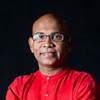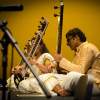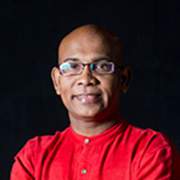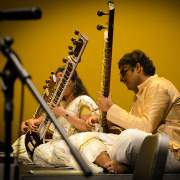Boundless
60 minutes, no intermission
Please be seated at least 15 minutes before the programme begins.
Event closed
Inspired by the creative processes fuelling mathematical research, Boundless portrays the intellectual and emotional pursuit of knowledge, depicting the journey to elusive worlds of infinite possibility that lie beyond the boundaries of knowledge.
Featuring premieres of original compositions and a special composition by T.R. Vijayakumar, NIMC Award Recipient (2002) and disciple of the legendary violinist Lalgudi G. Jayaraman, NUS Indian Instrumental Ensemble will present a voyage to the uncharted territories of musical and scientific knowledge.


Rajandra Vadivale

NUS Indian Instrumental Ensemble

Rajandra Vadivale
Music Director & Resident Conductor
Rajandra Vadivale was appointed Music Director of the NUS Indian Instrumental Ensemble (IIE) in 2004. Rajandra first ventured into the music arena as a saxophone and clarinet player. He switched to the flute when his late uncle and mentor, renowned Mridangist, V. Ramachandran introduced him to Indian classical music. Aged 15, he mastered the basics of the instruments under Nadaswara Vidwan M. Muruthaiya.
In 1977, Rajandra was engaged as a flautist with the reputed Ramakrishna Sangeetha Sabha Orchestra (RSSO). In 1982, sponsored by the RSSO, Rajandra obtained a rare opportunity to train under world-renowned flautist, Dr. N. Ramani for an intense and gruelling year in India. He was enriched by the experience, which widened his repertoire and further enhanced his performing style.

NUS Indian Instrumental Ensemble
Using music that has its roots deep within Indian culture, the NUS Indian Instrumental Ensemble (IIE) provides an open and inclusive environment to stage cultural dialogues with a diverse range of genres across the globe.
Since its founding in 1987, IIE has explored a plethora of themes that form the basis of traditional Indian music ranging from the evolution of music in the Indians subcontinent to religion and socio-political dialogues in the South Asian region.
IIE is made up primarily of five musical sections – veena, sitar, violin, tabla and vocals – with members also proficient in the flute, mandolin and mridangam. This range of instruments allows IIE to perform music that is representative of the ethnic diversity within India, from the Hindustani music of North India to the Carnatic music of South India. In its upcoming endeavours, the group is also looking to explore the relevance of this traditional art form in world music by blending elements of Indian music with elements of contemporary music genres.
